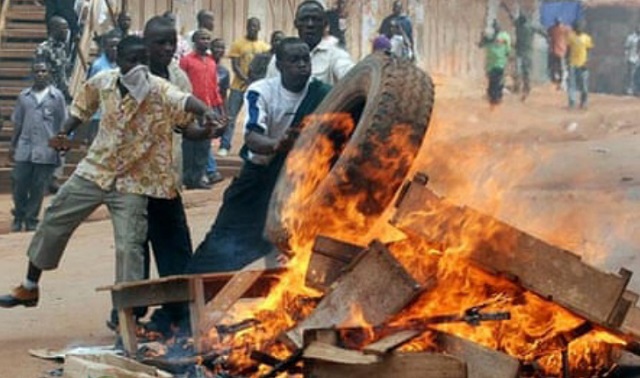
America warns
On Nov. 18, security personnel arrested the Forum for Democratic Change’s candidate, Patrick Oboi Amuriat, and the National Unity Platform’s Kyagulanyi Robert Ssentamu aka Bobi Wine, acts which triggered protests by the candidates’ supporters in various parts of the country.
In response security forces used brutal methods including shooting live rounds of ammunition to quell the riots. By the time the rioters were reined-in, over 50 Ugandans had lost their lives while hundreds were arrested and are in jail.
Senior government officials including President Museveni did not show remorse for what happened but instead justified the use of force on the unarmed rioters.
Days after the bloodshed in Kampala, Mukono, Masaka, Jinja, Iganga, Bugiri, Busia and Mbale, Gen. Elly Tumwine, the Minister of Security, told the nation that “the security officers have a right to shoot and kill protesters if they reach a certain level of violence.”
“If you threaten the lives of the security forces and the lives of the public, they have a right to shoot you. That is why they are armed with coercive weapons to make you fear committing crimes. So, if people don’t take that genuine and peaceful advice and want to gloss over it in chaos, they should go ahead,” he said.
Tumwine’s comments sent a chilling effect in the spines of many of Uganda’s human rights defenders and drew condemnation from local and international agencies including the United Nations. The latest caution came from Mike Pompeo, the outgoing US Secretary of State.
Pompeo said in a tweet on Dec.10 that although the United States is a longstanding partner of Uganda, “We expect our partners to live up to their obligations to hold free and fair elections.” “We are paying close attention to the actions of individuals who seek to impede the ongoing democratic process.”
Pompeo’s tweet came straight on the heels of outgoing Democratic Representative, Eliot Engel, the chairman of the House Committee on Foreign Affairs’ call on the Trump administration to take on immediate action to address a worsening human rights situation in Uganda ahead of the general election scheduled for next January.
Bracing for tougher times
Ugandan human rights defenders say they are bracing for even tougher times as the country draws closer to Jan.14— the day the country is expected to go to the polls to elect the next president.
Uganda’s 1995 Constitution guarantees basic freedoms that are the foundation for a free, fair and peaceful election. During elections, government agencies such as the Electoral Commission and the Uganda Police Force are expected to regulate and facilitate regular, free, and fair electoral processes. But Ugandans have been disturbed by recent events in the ongoing campaigns. Not that this has been a one-off event.
Robert Kirenga, the executive director of the National Coalition of Human Rights Defenders, says the trend of violations during the past four multiparty election cycles after the 2005 referendum has remained largely the same, and on occasion, deteriorated.
The perpetrators of violations and abuses range from state security agencies to unregulated militia groups and individuals.
Kirenga said that although human rights defenders are supposed to be protected under Article 50 of the Constitution, there is need to enact specific legislation prescribing and guaranteeing the rights of human rights defenders.
 Election Observers absent
Election Observers absent
Most violations could go unrecorded this time because, according to Aritua, there are no accredited international election observers and local monitors have failed to form a coalition this year to observe elections because most of the Civil Organisation Societies (CSOs) have not been accredited yet.
In Uganda, the largest domestic observation group is the Citizens Election Observers Network-Uganda (CEON-U). In the 2016 general elections, the network had 223 long-term observers deployed from October 2015 and an additional 900 short-term observers on Election Day in February 2016.
CEON-U observed the tallying at 112 District Tally Centres and the National Tally Centre. During its activities, CEON-U was targeted for its election monitoring activities. The Uganda Joint Christian Council (UJCC) was equally active. It used its existing network and infrastructure of around 700 observers to observe elections on Election Day.
During the 2016 general election period, the European Union found that the accreditation process for local observers was cumbersome, requiring a security vetting by the District Security Committee prior to the accreditation by the District Returning Officer (DRO), thus placing unwarranted obstacles to observation.
****
 The Independent Uganda: You get the Truth we Pay the Price
The Independent Uganda: You get the Truth we Pay the Price



